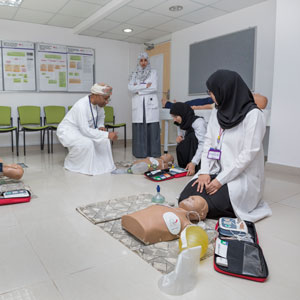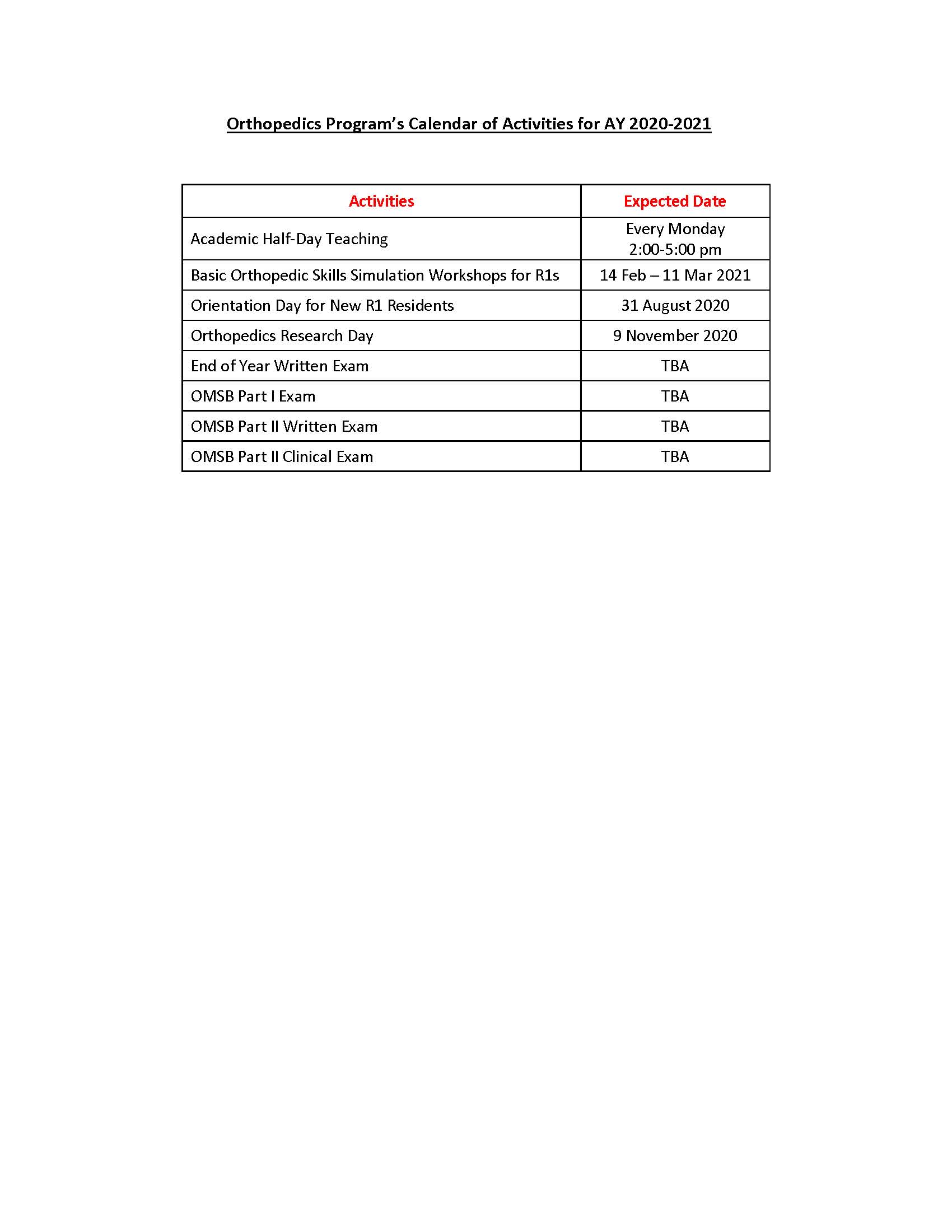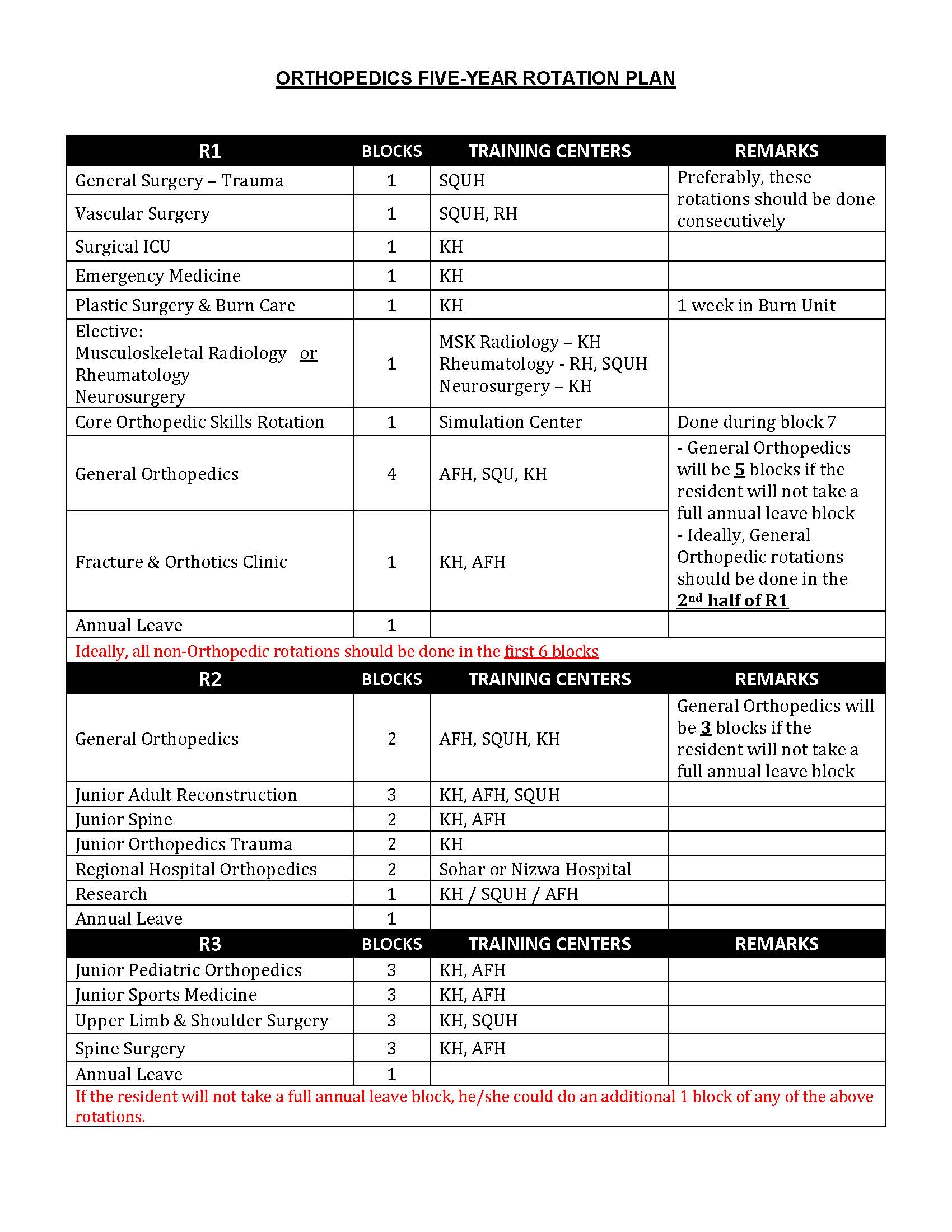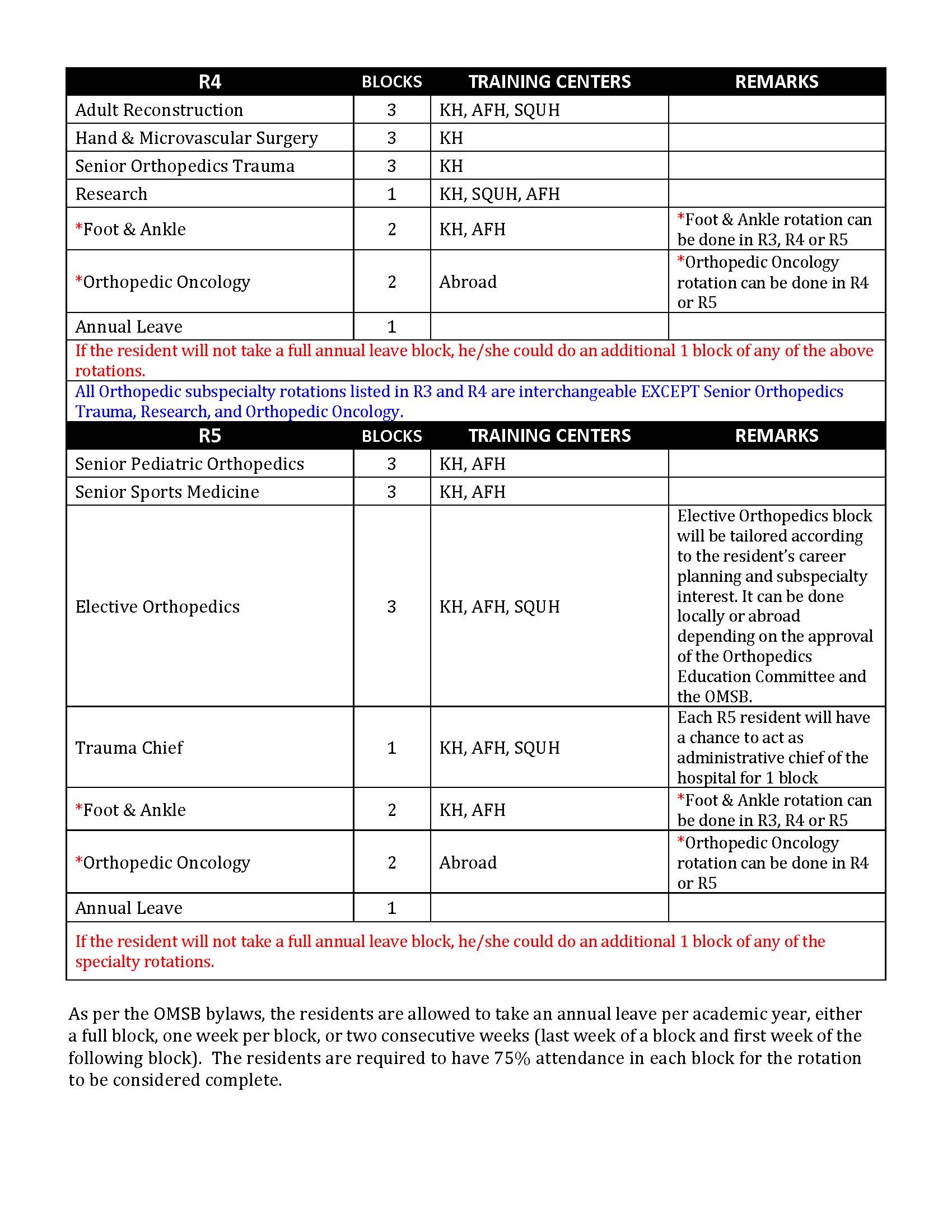
Orthopedics
The mission of the OMSB Orthopedics Residency Training Program is to provide the trainee with the highest level of knowledge, clinical and orthopedic surgical skills necessary to produce an orthopedic surgeon with the highest possible level of competence, who can function independently in any health care setting in Oman. The Orthopedics Residency Training Program is designed to fulfill the OMSB general and specific requirements of training.
To achieve excellence in care for patients with Orthopedic problems by producing a surgeon who is excellent in both knowledge and skills, and who is capable of updating himself/herself with latest studies and contributing to his/her field with research.
- Become proficient in the physical examination and diagnosis of patients with trauma
- Evaluate and treat patients in the emergency room, the orthopedic clinics, and in the hospital
- Perform initial and ongoing assessments of patient’s orthopedic, medical, physical and psycho-social status (proper assessment and clinical diagnosis)
- Become proficient in the physical examination and diagnosis of orthopedic patients
- Ensure that clinical interventions are carried out and appropriately documented (appropriate investigations)
- Provide patient education and counseling, covering health status, test results, medical processes, and discharge planning. (proper communication skills)
- Monitor medications to effectively provide appropriate drug therapy and treatment plans, thus ensuring positive patient outcomes
- Become proficient in the non-operative and operative management of patients. (proper communication skills)
- Become full oriented on how to deliver a cost effective health care
- Assist in surgery and perform surgeries under supervision to high international standards
- Become proficient in the physical examination and diagnosis of patients with trauma
- Evaluate and treat patients in the emergency room, the orthopedic clinics, and in the hospital.
- Perform initial and ongoing assessments of patient’s orthopedic, medical, physical and psychosocial status. (Proper assessment and clinical diagnosis)
- Become proficient in the physical examination and diagnosis of orthopedic patients. Ensure that clinical interventions are carried out and appropriately documented. (appropriate investigations)
- Provide patient education and counseling, covering health status, test results, medical processes, and discharge planning. (proper communication skills)
- Monitor medications to effectively provide appropriate drug therapy and treatment plans, thus ensuring positive patient outcomes.
- Become proficient in the non-operative and operative management of patients. (proper communication skills)
- Become full oriented on how to deliver a cost effective health care.
- Assist in surgery and perform surgeries under supervision to high international standards.
- Become proficient in the physical examination and diagnosis of patients with trauma
- Evaluate and treat patients in the emergency room, the orthopedic clinics, and in the hospital.
- Perform initial and ongoing assessments of patient’s orthopedic, medical, physical and psychosocial status. (Proper assessment and clinical diagnosis)
- Become proficient in the physical examination and diagnosis of orthopedic patients. Ensure that clinical interventions are carried out and appropriately documented. (appropriate investigations)
- Provide patient education and counseling, covering health status, test results, medical processes, and discharge planning. (proper communication skills)
- Monitor medications to effectively provide appropriate drug therapy and treatment plans, thus ensuring positive patient outcomes.
- Become proficient in the non-operative and operative management of patients. (proper communication skills)
- Become full oriented on how to deliver a cost effective health care.
- Assist in surgery and perform surgeries under supervision to high international standards.
Program Director:
Dr. Ahmed Saif Nasser Al Jahwari
Program Structure:
Duration of the Residency Training Program: Five (5) years
Required Rotations:
Training Centers:
- Khoula Hospital
- Armed Forces Hospital
- Sultan Qaboos University Hospital
- Sohar Hospital
- Nizwa Hospital
Minimum Requirements for Admission:
- The applicant must be a holder of a bachelor’s degree in Medicine and Surgery or equivalent from an accredited college or university.
- The applicant must have completed one year of a recognized internship program.
- The applicant must be of good conduct and medically fit for training.
- The applicant must pass the OMSB selection examination before being scheduled for interview.
- The applicant must pass the interview by the Orthopedics Education Committee.
- The applicant must complete the registration requirements.
General OMSB Evaluation Tools:
- In-Training Assessment Report
- Presentation Evaluation
- Procedural Skills Evaluation
- Mini-Clinical Exercise Evaluation
- Journal Club Presentation Evaluation
- Case-Based Discussion
- Research Block Evaluation
- Multi-Source Feedback (360 Degree Evaluation)
- Rotation Evaluation
- Faculty Evaluation by the Residents
- Six-Month and Annual Evaluation of the Residents
- Final In-Training Assessment Report
- Program Evaluation by the Resident
- Program Evaluation by the Faculty
Program-Specific Evaluation Tools (list and pdf attachment)
- Ottawa Surgical Competency Operating Room Evaluation (OSCORE)
- Procedure Based Assessment - Application of Hip Spica
- Procedure Based Assessment - Arthrotomy for Septic Hip
- Procedure Based Assessment – Carpal Tunnel Release
- Procedure Based Assessment – Diagnostic Shoulder Arthroscopy
- Procedure Based Assessment - Diagnostic Knee Arthroscopy
- Procedure Based Assessment – Intramedullary Nailing
- Procedure Based Assessment – Limb External Fixator
- Procedure Based Assessment – Lumbar Discectomy
- Procedure Based Assessment – MUA and K-wire Stabilisation Supracondylar Elbow Fracture
- Procedure Based Assessment – Open Rotator Cuff Repair
- Procedure Based Assessment – Open Shoulder Stabilisation
- Procedure Based Assessment – ORIF Ankle
- Procedure Based Assessment – ORIF Clavice Fracture
- Procedure Based Assessment – ORIF Distal Humerus Fracture
- Procedure Based Assessment – ORIF Humeral Shaft Fracture
- Procedure Based Assessment – ORIF Proximal Humerus Fracture
- Procedure Based Assessment – Ponseti Casting Tenotomy
- Procedure Based Assessment – Slipped Upper Femoral Epiphypsis
- Procedure Based Assessment – Tendon Repair
- Procedure Based Assessment – Total Hip Replacement
- Procedure Based Assessment – Total Knee Replacement
- Procedure Based Assessment – DHS for Intertrochanteric Femoral Neck Fracture
Progression Examinations:
- End of Year Written Exam - R1 to R4
- End of Year Clinical Exam - R2 to R4
- OMSB Part I Exam - R2
Exit Qualification:
-
OMSB Part II Written and Clinical Exams - R5
Other International Examinations:
- Orthopedics In-Training Examination (optional)

ORTHOPEDICS PROGRAM’S EDUCATION COMMITTEE
|
|
NAME |
POSITION |
HOSPITAL |
|
1 |
Dr. Ahmed Saif Nasser Al Jahwari |
Program Director |
AFH |
|
2 |
Dr. Abdullah Ali Marzooq Al Ajmi |
Associate Program Director |
Khoula Hospital |
|
3 |
Dr. Yaqoub Sulaiman Salim Al Mufargi |
Associate Program Director |
AFH |
|
4 |
Dr. Ahmed Yaseen Mohammed Al Hadeethi |
Associate Program Director |
SQUH |
|
5 |
Dr. Ahmed Ali Hamed Al Rashdi |
Member |
AFH |
|
6 |
Dr. Ahmed Said Ali Al Mandhari |
Member |
Khoula Hospital |
|
7 |
Dr. Vasudeva Kodavoor Aithal |
Member |
Sohar Hospital |
|
8 |
Dr. Gopal Malhotra |
Member |
Khoula Hospital |
Contact Information
Program Medical Executive: Didith Olarve
Program e-mail: orthopedics@omsb.org
Office number: (968) 24181029
OMSB Website: www.omsb.gov.om


